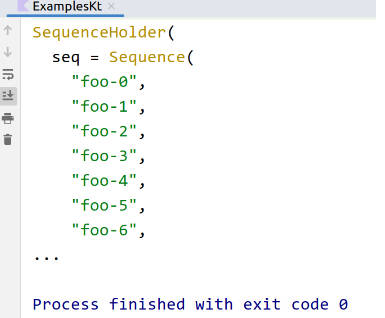kotlin-semver
Semantic Versioning library for Kotlin Multiplatform.
It implements the full semantic version 2.0.0 specification and
provides ability to parse, compare, and increment semantic versions.
The API Documentation is available here.
Install with Gradle
This library is available in Maven Central, so you have to add it to your repositories.
repositories {
mavenCentral()
}
Then, you can add the package to the dependencies list.
dependencies {
implementation("io.github.z4kn4fein:semver:1.+")
}
Usage
The following options are supported to construct a Version:
-
Building part by part.
Version(major = 3, minor = 5, patch = 2, preRelease = "alpha", buildMetadata = "build")
-
Parsing from a string with
Version.parse().Version.parse("3.5.2-alpha+build")
-
Using the
toVersion()ortoVersionOrNull()extension methods on a string."3.5.2-alpha+build".toVersion()
The following information is accessible on a constructed Version object:
val version = "3.5.2-alpha.2+build".toVersion()
version.major // 3
version.minor // 5
version.patch // 2
version.preRelease // "alpha.2"
version.buildMetadata // "build"
version.isPreRelease // true
version.toString() // "3.5.2-alpha.2+build"
Version also supports destructuring.
val version = "2.3.1-alpha.2+build".toVersion()
val (major, minor, patch, preRelease, buildMetadata) = version
// major: 2
// minor: 3
// patch: 1
// preRelease: "alpha.2"
// buildMetadata: "build"
Compare / Sort / Range
It is possible to compare two Version objects with comparison operators or with .compareTo().
"0.1.1".toVersion() > "0.1.0".toVersion() // true
"0.1.1".toVersion() <= "0.1.1".toVersion() // true
"0.1.0-alpha.3".toVersion() < "0.1.0-alpha.4".toVersion() // true
"0.1.1".toVersion().compareTo("0.1.0".toVersion()) // 1
"0.1.0".toVersion().compareTo("0.1.1".toVersion()) // -1
"0.1.1".toVersion().compareTo("0.1.1".toVersion()) // 0
The equality of two Version objects can be determined with equality operators or with equals().
"0.1.1".toVersion() == "0.1.1".toVersion() // true
"0.1.1".toVersion() != "0.1.1".toVersion() // false
"0.1.1".toVersion().equals("0.1.1".toVersion()) // true
"0.1.0".toVersion().equals("0.1.1".toVersion()) // false
As Version objects are comparable, a collection of them can be sorted easily like in the following example.
val list: List<Version> = listOf(
"1.0.1".toVersion(),
"1.0.1-alpha".toVersion(),
"1.0.1-alpha.beta".toVersion(),
"1.0.1-alpha.3".toVersion(),
"1.0.1-alpha.2".toVersion(),
"1.1.0".toVersion(),
"1.1.0+build".toVersion(),
).sorted()
// The content will be:
// "1.0.1-alpha"
// "1.0.1-alpha.2"
// "1.0.1-alpha.3"
// "1.0.1-alpha.beta"
// "1.0.1"
// "1.1.0"
// "1.1.0+build"
Having an order provides the ability to determine whether a Version is in the range between two given versions.
val range = "1.0.0".toVersion().."1.1.0".toVersion()
"1.0.1".toVersion() in range // true
"1.1.1".toVersion() in range // false
Increment
Version objects can produce incremented versions of themselves with the next{Major|Minor|Patch|PreRelease}() methods.
These methods can be used to determine the next version in order by increasing the appropriate identifier.
When the version is stable:
val stableVersion = "1.0.0".toVersion()
val nextMajor = stableVersion.nextMajor() // 2.0.0
val nextMinor = stableVersion.nextMinor() // 1.1.0
val nextPatch = stableVersion.nextPatch() // 1.0.1
val nextPreRelease = stableVersion.nextPreRelease() // 1.0.1-0
When the version is unstable:
val unstableVersion = "1.0.0-alpha.2+build.1".toVersion()
val nextMajor = unstableVersion.nextMajor() // 2.0.0
val nextMinor = unstableVersion.nextMinor() // 1.1.0
val nextPatch = unstableVersion.nextPatch() // 1.0.0
val nextPreRelease = unstableVersion.nextPreRelease() // 1.0.0-alpha.3
Versionobjects are immutable, so each incrementing function creates a newVersion.
Copy
It’s possible to make a copy of a particular version with the copy() method.
It allows altering the copied version’s properties with optional parameters.
val version = "1.0.0-alpha.2+build.1".toVersion()
val exactCopy = version.copy() // 1.0.0-alpha.2+build.1
val withDifferentMajor = version.copy(major = 3) // 3.0.0-alpha.2+build.1
val withDifferentMinor = version.copy(minor = 4) // 1.4.0-alpha.2+build.1
val withDifferentPatch = version.copy(patch = 5) // 1.0.5-alpha.2+build.1
val withDifferentPreRelease = version.copy(preRelease = "alpha.4") // 1.0.0-alpha.4+build.1
val withDifferentBuildMetadata = version.copy(buildMetadata = "build.3") // 1.0.0-alpha.2+build.3
val withDifferentNumbers = version.copy(major = 3, minor = 4, patch = 5) // 3.4.5-alpha.2+build.1
Without setting any optional parameter, the
copy()method will produce an exact copy of the original version.
Invalid Versions
When the version parsing fails due to an invalid format, the library throws a specific VersionFormatException.
The
toVersionOrNull()method can be used for exception-less conversions as it returnsnullwhen the version parsing fails.








